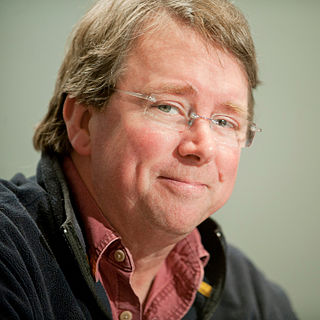Related Research Articles

Sir Arthur George Tansley FLS, FRS was an English botanist and a pioneer in the science of ecology.
Chemical ecology is the study of chemically mediated interactions between living organisms, and the effects of those interactions on the demography, behavior and ultimately evolution of the organisms involved. It is thus a vast and highly interdisciplinary field. Chemical ecologists seek to identify the specific molecules that function as signals mediating community or ecosystem processes and to understand the evolution of these signals. The substances that serve in such roles are typically small, readily-diffusible organic molecules, but can also include larger molecules and small peptides.

The soil food web is the community of organisms living all or part of their lives in the soil. It describes a complex living system in the soil and how it interacts with the environment, plants, and animals.
Herbivores are dependent on plants for food, and have coevolved mechanisms to obtain this food despite the evolution of a diverse arsenal of plant defenses against herbivory. Herbivore adaptations to plant defense have been likened to "offensive traits" and consist of those traits that allow for increased feeding and use of a host. Plants, on the other hand, protect their resources for use in growth and reproduction, by limiting the ability of herbivores to eat them. Relationships between herbivores and their host plants often results in reciprocal evolutionary change. When a herbivore eats a plant it selects for plants that can mount a defensive response, whether the response is incorporated biochemically or physically, or induced as a counterattack. In cases where this relationship demonstrates "specificity", and "reciprocity", the species are thought to have coevolved. The escape and radiation mechanisms for coevolution, presents the idea that adaptations in herbivores and their host plants, has been the driving force behind speciation. The coevolution that occurs between plants and herbivores that ultimately results in the speciation of both can be further explained by the Red Queen hypothesis. This hypothesis states that competitive success and failure evolve back and forth through organizational learning. The act of an organism facing competition with another organism ultimately leads to an increase in the organism's performance due to selection. This increase in competitive success then forces the competing organism to increase its performance through selection as well, thus creating an "arms race" between the two species. Herbivores evolve due to plant defenses because plants must increase their competitive performance first due to herbivore competitive success.

The trophic level of an organism is the position it occupies in a food web. Within a food web, a food chain is a succession of organisms that eat other organisms and may, in turn, be eaten themselves. The trophic level of an organism is the number of steps it is from the start of the chain. A food web starts at trophic level 1 with primary producers such as plants, can move to herbivores at level 2, carnivores at level 3 or higher, and typically finish with apex predators at level 4 or 5. The path along the chain can form either a one-way flow or a part of a wider food "web". Ecological communities with higher biodiversity form more complex trophic paths.

Lawrence Basil Slobodkin was an American ecologist and Professor Emeritus at the Department of Ecology and Evolution, Stony Brook University, State University of New York. He was one of the leading pioneers of modern ecology. His innovative thinking and research, provocative teaching, and visionary leadership helped transform ecology into a modern science, with deep links to evolution.
Robert F. Denno (1945–2008) was an influential insect ecologist. He published more than 130 research papers that helped advance the study of plant–insect interactions, interspecific competition, predator prey interactions and food web dynamics. He studied the ecology of sap-feeding insects, both in natural and cultivated settings. His study of wing polymorphism expanded into the fields of life history evolution, plant and herbivore interactions, community ecology, and many aspects of predator ecology, reviewed recently in Denno et al. (2005).

Plant ecology is a subdiscipline of ecology that studies the distribution and abundance of plants, the effects of environmental factors upon the abundance of plants, and the interactions among plants and between plants and other organisms. Examples of these are the distribution of temperate deciduous forests in North America, the effects of drought or flooding upon plant survival, and competition among desert plants for water, or effects of herds of grazing animals upon the composition of grasslands.

Ecological fitting is "the process whereby organisms colonize and persist in novel environments, use novel resources or form novel associations with other species as a result of the suites of traits that they carry at the time they encounter the novel condition". It can be understood as a situation in which a species' interactions with its biotic and abiotic environment seem to indicate a history of coevolution, when in actuality the relevant traits evolved in response to a different set of biotic and abiotic conditions.

Ian Thomas Baldwin is an American ecologist.
Malcolm Colin Press is a British ecologist, professor and Vice-Chancellor of Manchester Metropolitan University (MMU), in the United Kingdom.

Hugh David Loxdale is an entomologist. He was professor of ecology at the Institute of Ecology, University of Jena from 2009 to 2010, president of the Royal Entomological Society from 2004 to 2006, and honorary visiting professor at the School of Biosciences, Cardiff University. Loxdale works on the population biology, ecology, and genetics of insects, especially aphids and their wasp parasitoids.

Judith (Judy) H. Myers is a Canadian-American ecologist. In 2014, she was elected president of the Canadian Society for Ecology and Evolution, and served in that role until 2016. Professor Myers is well known for her decades-long research into plant-animal-microbe interactions, including insect pest outbreaks, viral pathogens of insects, and pioneering work on biological control of insects and plants, particularly invasive species. Throughout her career she has advocated strongly for both the public understanding of science and for increasing the number of women in the STEM subjects: Science, Technology, Engineering, and Mathematics.
Lynne Boddy is a Professor of Microbial Ecology at Cardiff University. She works on the ecology of wood decomposition, including synecology and autecology. She won the 2018 Learned Society of Wales Frances Hoggan Medal.

Helen Elizabeth Roy, is a British ecologist, entomologist, and academic, specialising in ladybirds and non-native species. Since 2007, she has been a principal scientist and ecologist at the NERC's Centre for Ecology & Hydrology. From 1997 to 2008, she taught at Anglia Ruskin University, rising to the rank of Reader in Ecology. She is the co-organiser of the UK Ladybird Survey, alongside Dr Peter Brown, is a visiting professor in the School of Biological Sciences, University of Reading, is co-chair of the IPBES assessment of invasive alien species, and is a past President of the Royal Entomological Society.
Julia Koricheva is an ecologist in the UK. She is professor of ecology at Royal Holloway, University of London and she researches ecosystem services in forests, the interactions between insects and plants and is an expert in meta-analysis.
Jane Memmott is an ecologist and entomologist from the United Kingdom. She is professor of ecology at the University of Bristol. Her research focuses on community ecology and she is an expert on the interactions between insect pollinators and plants.
Jane Katharine Hill Hon.FRES is British ecologist, and professor of ecology at the University of York and is the current President of the Royal Entomological Society; research includes the effects of climate change and habitat degradation on insects.
Alison Hester is an ecologist in the UK, a professor at the Aberdeen site of the James Hutton Institute, Scotland, and an expert in the effects of land management on biodiversity.
Bridget Emmett is a British ecologist, Professor and Science Area Head for the UK Centre for Ecology & Hydrology. She is the President of British Ecological Society from 2024.
References
- ↑ Sheffield, University of. "Appointment of Vice-President for Research - Latest news - Staff - The University of Sheffield". www.sheffield.ac.uk. Retrieved 3 February 2020.
- ↑ "Hartley, Professor Sue - Biology, The University of York". www.york.ac.uk.
- ↑ "Birthday Honours lists 2019" (PDF). UK Government. 7 June 2019. Retrieved 9 June 2019.